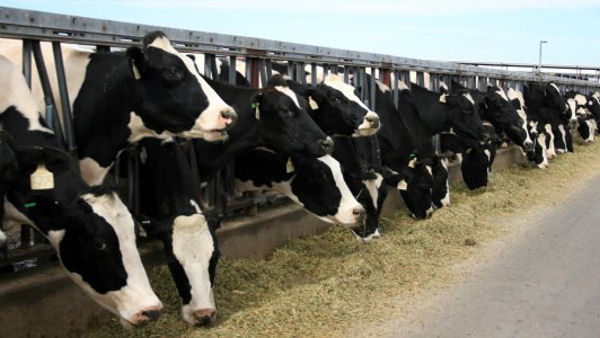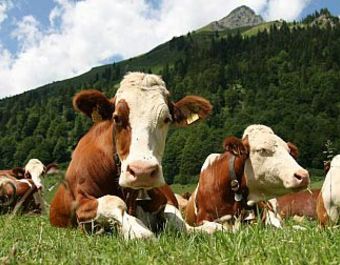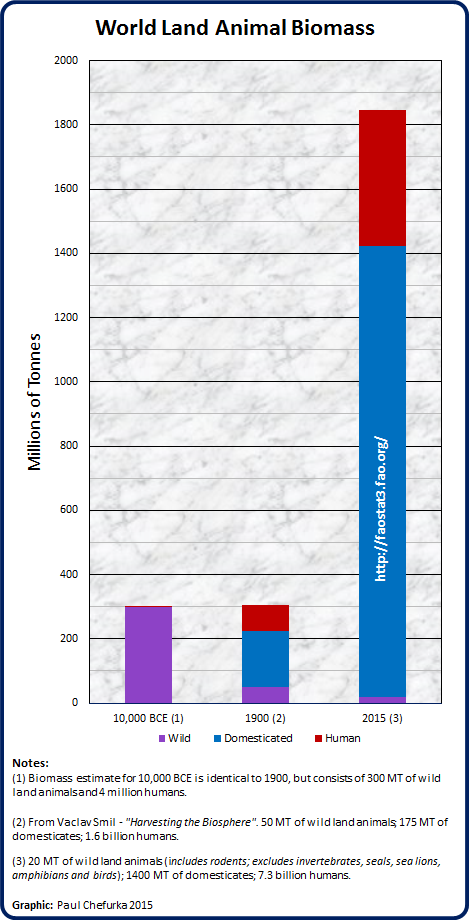Environment & Energy
Related: About this forumIndustrial farming is perhaps one of the worst crimes in history
by Yuval Noah Harari
The Guardian
Sept 25, 2015
Animals are the main victims of history, and the treatment of domesticated animals in industrial farms is perhaps the worst crime in history. The march of human progress is strewn with dead animals. Even tens of thousands of years ago, our stone age ancestors were already responsible for a series of ecological disasters. When the first humans reached Australia about 45,000 years ago, they quickly drove to extinction 90% of its large animals. This was the first significant impact that Homo sapiens had on the planet’s ecosystem. It was not the last....

....What makes the existence of domesticated farm animals particularly cruel is not just the way in which they die but above all how they live. Two competing factors have shaped the living conditions of farm animals: on the one hand, humans want meat, milk, eggs, leather, animal muscle-power and amusement; on the other, humans have to ensure the long-term survival and reproduction of farm animals. Theoretically, this should protect animals from extreme cruelty. If a farmer milks his cow without providing her with food and water, milk production will dwindle, and the cow herself will quickly die. Unfortunately, humans can cause tremendous suffering to farm animals in other ways, even while ensuring their survival and reproduction. The root of the problem is that domesticated animals have inherited from their wild ancestors many physical, emotional and social needs that are redundant in farms. Farmers routinely ignore these needs without paying any economic price. They lock animals in tiny cages, mutilate their horns and tails, separate mothers from offspring, and selectively breed monstrosities. The animals suffer greatly, yet they live on and multiply.

....large Snip....
In 2009, there were 1.6 billion wild birds in Europe, counting all species together. That same year, the European meat and egg industry raised 1.9 billion chickens. Altogether, the domesticated animals of the world weigh about 700m tonnes, compared with 300m tonnes for humans, and fewer than 100m tonnes for large wild animals.
The scientific study of animals has played a dismal role in this tragedy. The scientific community has used its growing knowledge of animals mainly to manipulate their lives more efficiently in the service of human industry. Yet this same knowledge has demonstrated beyond reasonable doubt that farm animals are sentient beings, with intricate social relations and sophisticated psychological patterns. They may not be as intelligent as us, but they certainly know pain, fear and loneliness. They too can suffer, and they too can be happy.
It is high time we take these scientific findings to heart, because as human power keeps growing, our ability to harm or benefit other animals grows with it. For 4bn years, life on Earth was governed by natural selection. Now it is governed increasingly by human intelligent design. Biotechnology, nanotechnology and artificial intelligence will soon enable humans to reshape living beings in radical new ways, which will redefine the very meaning of life. When we come to design this brave new world, we should take into account the welfare of all sentient beings, and not just of Homo sapiens.
http://www.theguardian.com/books/2015/sep/25/industrial-farming-one-worst-crimes-history-ethical-question
Its so hard to be reminded of this, but I felt the need to post this when I read the article. Mayb just I needed to be reminded. hahaha I buy free range eggs & meats that claim to be from animals raised humanely, but still. I eat out. No meat from happy animals in that....
Factory farms pack animals into spaces so tight that most can barely move. Many have no access to the outdoors, spending their lives on open warehouse floors, or housed in cages or pens. Without the room to engage in natural behaviors, confined animals experience severe physical and mental distress.
...Daily life in a factory farm is one of pain, frustration and misery—and animals are not the only ones suffering. Human health and our environment are being hurt by factory farming, too.
Waste runoff from factory farms pollutes the water, land and air in neighboring communities, compromising both human health and quality of life. At the same time, these businesses consume massive quantities of precious, finite resources including water and fossil fuels.
Factory farms also endanger consumer health. Farms that are not properly maintained can be breeding grounds for salmonella and E. coli, which are passed to humans through meat, dairy and eggs. To combat these unsanitary conditions, animals are fed large doses of antibiotics—but bacteria is constantly adapting and evolving. Antibiotic abuse creates the potential for dangerous, new drug-resistant strains of bacteria to develop and spread among people.
Here's an interesting podcast from NPR~
'Tales' Of Pig Intelligence, Factory Farming And Humane Bacon
LISTEN
And to counter the sad pics above, here are some free range animals that look much happier


Its more expensive to buy free range, but its worth it, to me. I cut back on the amount of meat we eat to splurge on what is hopefully ethical meat. (Unless you know the farm, how can we really know for sure)
And I know most of us here know this already, but just in case, always buy free range eggs & pass on the "cage free". They can just shove them all in a room with no room to move & declare the chickens are "cage free". grrrrrrr
...One last thing & I'll get off my soapbox
Case in point, an Ohio egg producer lured 10 immigrants to the US with promises of a better life. They were held as slaves. Thank God this was discovered & now the greedy, evil business owners are going to jail.
September 17, 2015
Ohio Labor Traffickers Plead Guilty
(I thought that only happened in countries like Malaysia. I'm just horrified it goes on in the US)
...OK I lied, THIS is the last thing I'll post before leaving the soapbox~
Episode Info
This week, we speak to New York Times reporter Michael Moss about the Dead Pit, a USDA livestock research facility in Nebraska that has caused the deaths of thousands of animals in the name of higher profits.
LISTEN
stuntcat
(12,022 posts)Last edited Thu Oct 15, 2015, 12:17 PM - Edit history (2)
BACON though, right DU!? ![]()
you selfish self-worshipping fucking monkeys.
I hope not.![]()
Kilgore
(1,733 posts)The2ndWheel
(7,947 posts)We're not educated for our own benefit. It's so that we can pay taxes that maintain that machine. One size must fit all. Even Wal-Mart started out as a small business.
RiverLover
(7,830 posts)And its really hard to imagine Wal-mart was ever small. I know its true, just hard to reconcile that with what its become. With our help.

DustyJoe
(849 posts)http://www.huffingtonpost.com/2013/06/19/food-stamps-military_n_3462465.html
This is just plain wrong !
RiverLover
(7,830 posts)We shipped our jobs across the seas for low, low prices. Collateral damage. Support our troops...what does the rethug party mean I wonder, when they say that. I don't think they're talking food stamps. But they should know they are.
roody
(10,849 posts)cheapdate
(3,811 posts)Young hogs stay close to their mother for up to two years, and remained attached to their family for life. The way we treat them in factory farms is indeed a monumental crime.
NickB79
(19,253 posts)Topsoil that will take thousands of years to rebuild, if not longer.
Duppers
(28,125 posts)Had bookmarked. Thanks for the reference in another thread, RiverLover.
Wish I could listen to the ATK podcast but I cannot. Too depressed already.
Liberal_in_LA
(44,397 posts)GliderGuider
(21,088 posts)
Humans farm about 3 to 4 times our own biomass in food animals, and have been doing so since before 1900. In the process, wild animals are being extirpated both through direct murder as well as through a process called "competitive exclusion", a natural phenomenon that occurs when multiple species compete for the same resources. The successful species excludes others from those resources - food, water, habitat etc. - thereby reducing their numbers, sometimes drastically. It's a biological example of H. T. Odum's "Maximum Power Principle" operating through natural selection, supercharged by the uniquely human ability to think while shutting off our feelings.
It's an egregious situation. I don't know what will change it on a global level. Universal moral awakenings are few and far between. The best we seem to be able to do is to move down the food chain personally - if we can. Not all of us can, which can be emotionally distressing.
IMO the best long-term answer to this is the same as it is for every other ecological problem on the planet: Don't have children.
GliderGuider
(21,088 posts)Wild animals have been extinguished, domesticated animals have been tortured, and human health has been damaged beyond repair. I have a lot of sympathy with Jared Diamond's view:
There are at least three sets of reasons to explain the findings that agriculture was bad for health. First, hunter-gatherers enjoyed a varied diet, while early fanners obtained most of their food from one or a few starchy crops. The farmers gained cheap calories at the cost of poor nutrition, (today just three high-carbohydrate plants -- wheat, rice, and corn -- provide the bulk of the calories consumed by the human species, yet each one is deficient in certain vitamins or amino acids essential to life.) Second, because of dependence on a limited number of crops, farmers ran the risk of starvation if one crop failed. Finally, the mere fact that agriculture encouraged people to clump together in crowded societies, many of which then carried on trade with other crowded societies, led to the spread of parasites and infectious disease. (Some archaeologists think it was the crowding, rather than agriculture, that promoted disease, but this is a chicken-and-egg argument, because crowding encourages agriculture and vice versa.) Epidemics couldn't take hold when populations were scattered in small bands that constantly shifted camp. Tuberculosis and diarrheal disease had to await the rise of farming, measles and bubonic plague the appearance of large cities.
Farming may have encouraged inequality between the sexes, as well. Freed from the need to transport their babies during a nomadic existence, and under pressure to produce more hands to till the fields, farming women tended to have more frequent pregnancies than their hunter-gatherer counterparts -- with consequent drains on their health. Among the Chilean mummies for example, more women than men had bone lesions from infectious disease.
Hunter-gatherers practiced the most successful and longest-lasting life style in human history. In contrast, we're still struggling with the mess into which agriculture has tumbled us, and it's unclear whether we can solve it. Suppose that an archaeologist who had visited from outer space were trying to explain human history to his fellow spacelings. He might illustrate the results of his digs by a 24-hour clock on which one hour represents 100,000 years of real past time. If the history of the human race began at midnight, then we would now be almost at the end of our first day. We lived as hunter-gatherers for nearly the whole of that day, from midnight through dawn, noon, and sunset. Finally, at 11:54 p. m. we adopted agriculture. As our second midnight approaches, will the plight of famine-stricken peasants gradually spread to engulf us all? Or will we somehow achieve those seductive blessings that we imagine behind agriculture's glittering facade, and that have so far eluded us?